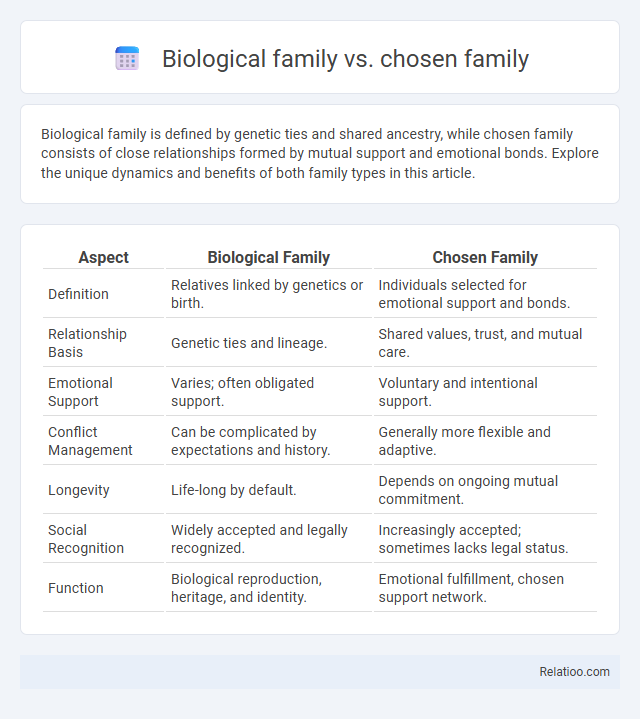Biological family is defined by genetic ties and shared ancestry, while chosen family consists of close relationships formed by mutual support and emotional bonds. Explore the unique dynamics and benefits of both family types in this article.
Table of Comparison
| Aspect | Biological Family | Chosen Family |
|---|---|---|
| Definition | Relatives linked by genetics or birth. | Individuals selected for emotional support and bonds. |
| Relationship Basis | Genetic ties and lineage. | Shared values, trust, and mutual care. |
| Emotional Support | Varies; often obligated support. | Voluntary and intentional support. |
| Conflict Management | Can be complicated by expectations and history. | Generally more flexible and adaptive. |
| Longevity | Life-long by default. | Depends on ongoing mutual commitment. |
| Social Recognition | Widely accepted and legally recognized. | Increasingly accepted; sometimes lacks legal status. |
| Function | Biological reproduction, heritage, and identity. | Emotional fulfillment, chosen support network. |
Understanding Biological Family: Definition and Importance
Biological family consists of individuals related by genetics, sharing inherited traits and medical history crucial for health assessments and identity formation. The importance of biological family lies in its role as the foundational support system influencing emotional development, cultural heritage, and social belonging. Understanding biological family helps in recognizing innate connections and obligations that shape personal and collective well-being.
What is a Chosen Family? Origins and Evolution
Chosen family refers to a supportive network of individuals you intentionally select to provide emotional care, often filling gaps left by biological family connections. Originating within marginalized communities, particularly LGBTQ+ groups, chosen families have evolved as essential units for resilience, acceptance, and belonging. Your emotional support system can be enriched by the trust and flexibility that chosen families uniquely offer, differing from traditional biological ties.
Emotional Bonds: Nature vs. Nurture
Emotional bonds in biological families often stem from genetic ties and shared environments, influencing attachment and identity through inherited traits and early life experiences. Chosen families, formed by deliberate social connections, highlight the role of nurturing and mutual support in creating strong emotional ties independent of biology. Both types of families demonstrate that emotional support arises from a complex interplay of innate predispositions and experiential factors, shaping resilience and psychological well-being.
Legal Rights and Social Recognition
Biological family rights are typically protected by law, granting automatic inheritance, custody, and decision-making privileges, whereas chosen families often lack formal legal recognition despite providing critical emotional support. Your ability to secure legal rights with chosen family members depends on tools like wills, power of attorney, and cohabitation agreements, which may not be uniformly recognized across jurisdictions. Emotional support networks, whether biological or chosen, significantly impact mental health and wellbeing, yet their social recognition varies widely, influencing access to benefits, healthcare decisions, and social acceptance.
Support Systems: Who Has Your Back?
Biological family often provides foundational support rooted in shared genetics and lifelong bonds, yet chosen family--comprising close friends and loved ones selected for mutual care--can offer tailored emotional support that biological ties sometimes lack. Emotional support systems thrive best when both biological and chosen families contribute to one's well-being, providing diverse perspectives and reliability during times of stress. Prioritizing relationships based on trust, empathy, and consistent presence builds the strongest support system, ensuring someone has your back regardless of biological ties.
Family Dynamics: Obligation versus Choice
Biological family often involves inherent obligations shaped by genetics and traditional roles, whereas chosen family is founded on voluntary, emotionally supportive relationships that prioritize mutual respect and shared values. Your emotional support network can influence how you navigate these family dynamics, balancing inherited responsibilities with personal autonomy. Understanding the nuanced distinctions between obligation and choice helps foster healthier connections and reinforces the value of emotional support in your life.
Cultural Perspectives on Family Structures
Cultural perspectives on family structures significantly influence the definitions and roles of biological family, chosen family, and emotional support networks across societies. In collectivist cultures, biological family often holds primary importance due to shared ancestry and traditional obligations, whereas individualistic societies increasingly recognize chosen families formed through emotional bonds and mutual support regardless of blood ties. Emotional support, vital in all cultures, may derive from either biological or chosen family, reflecting evolving social norms that prioritize psychological well-being and personal identity within diverse cultural contexts.
Navigating Conflict: Biological vs. Chosen Families
Navigating conflict between biological and chosen families requires understanding the unique dynamics each relationship entails; biological family ties often carry deep-rooted expectations and shared history, while chosen families are built on mutual support and personal values. Your emotional support system thrives when you establish clear boundaries and prioritize open communication, allowing conflicts to be resolved with empathy and respect. Balancing these relationships involves recognizing the importance of both natural bonds and chosen connections in fostering your overall well-being.
The Role of Acceptance and Belonging
Biological family often provides a foundational sense of belonging rooted in genetics and shared history, but acceptance within these ties can vary widely, influencing emotional support availability. Chosen family, formed through deliberate bonds and mutual acceptance, offers a critical space where You experience unconditional support and genuine connection, especially when biological ties fall short. The role of acceptance in both family types is key to fulfilling emotional support needs, underscoring the human drive for belonging and affirmation regardless of biological origins.
Redefining Family in Modern Society
Modern society increasingly redefines family by emphasizing chosen family over traditional biological ties, highlighting emotional support as a critical determinant of familial bonds. Chosen families, often formed through deep emotional connections rather than genetics, offer inclusive, resilient networks essential for personal well-being and social identity. This shift reflects evolving social dynamics where emotional support and mutual care surpass biological lineage as the foundation of family.

Infographic: Biological family vs Chosen family
 relatioo.com
relatioo.com